12 Unhealthiest Broths You Can Buy
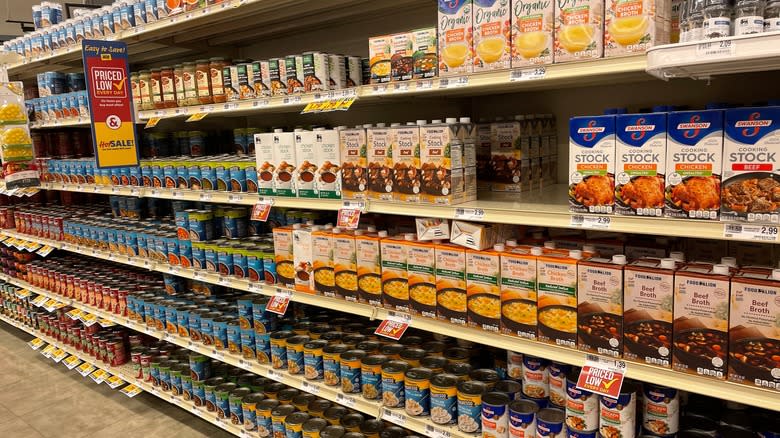
Broth is a pantry staple that almost every household has on hand. It can be used for a large variety of dishes -- by itself as a soothing beverage, to cook rice or quinoa, and, of course, as the base for quite a few soup recipes. The one thing to keep in mind is the nutritional content of the broth you are using. If it's the base for the meal you are about to create, you likely would want it to be chock full of nutrients to add to the dish. What you don't want is too much sodium, a lack of nutrient-dense ingredients, and unnecessary sugars and fats.
You have probably noticed that many brands of broth carry a regular version and a reduced sodium version. This is because the FDA recommends a limit of 2,300 milligrams of sodium per day for most adults. However, on average, Americans consume more like 3,400 milligrams of sodium per day. Some of the broths we are about to discuss have upwards of 1,000 milligrams of sodium per serving, almost half the recommended daily amount! Having an excess of sodium causes your heart to work extra hard because it increases blood volume. In turn, this can lead to major issues like stroke, heart disease, and high blood pressure.
High sodium and other ingredients can make some broths a bit much, depending on your dietary needs. Here are some of the most unhealthy ones you may wish to avoid.
Read more: 16 Little-Known Facts About Salt
Kroger Chicken Broth
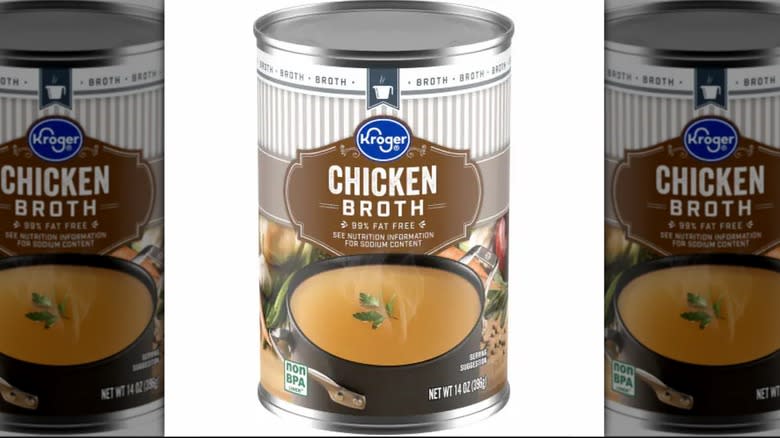
Kroger was actually the first grocery store in the country to produce its own goods. Many people love Kroger because of its low prices, wide variety, and private label. Although Kroger has many wonderful options, its brand label chicken broth is perhaps not something that you should be throwing into your cart.
This broth has one of the highest amounts of sodium we've seen per 14-ounce serving, packing in 1,380 milligrams, or nearly 60% of the daily recommended amount. Now, depending on what you are using the broth for -- such as employing it as a base for a larger meal -- you could easily end up going over your daily sodium amount with just one dish.
The broth also doesn't provide many vitamins or minerals -- just a measly 10 milligrams of calcium and 33 milligrams of potassium. Neither of those amounts even reach 1% of the daily recommended dose. If you are set on sticking with the Kroger brand, we recommend that you get the reduced sodium version of this broth. However, you still won't be getting many nutritional benefits from the item -- just a lower sodium count.
Stop And Shop Beef Broth
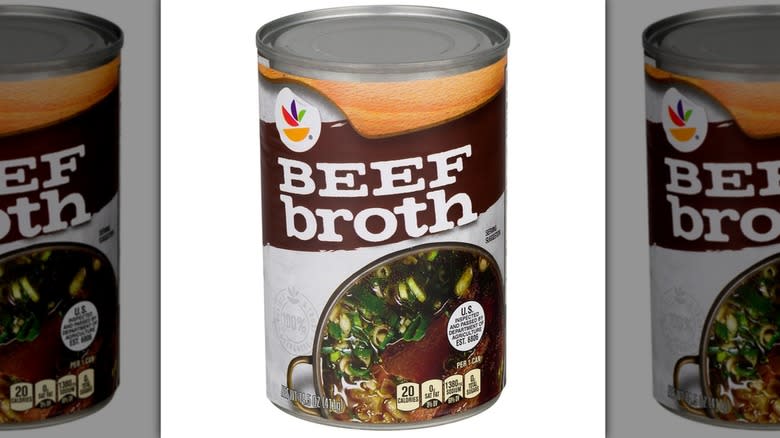
Like many grocery stores, Stop and Shop has its own name brand items for almost everything you can think of. The store brand beef broth contains a whopping 1,380 milligrams of sodium in a one-can serving size of 14.5 ounces, containing over half of the daily recommended serving of sodium in one serving.
The ingredients list isn't too impressive, either. This includes the additive maltodextrin, a type of carbohydrate that is ultra-processed. Studies have shown that maltodextrin is linked to inflammation in the digestive system, which in turn causes bad bacteria to outweigh good, digestion-assisting bacteria in the gut (via Cellular and Molecular Gastroenterology and Hepatology).
This additive can be found in many foods like artificial sweeteners, cereal, and sauces. To be fair, the FDA does officially recognize maltodextrin as safe for consumption. However, since it can be found in many types of foods, you could be consuming more of this additive than you think, so knowing it's in this broth can be useful information, especially if you wish to avoid it.
CVS Gold Emblem Chicken Broth
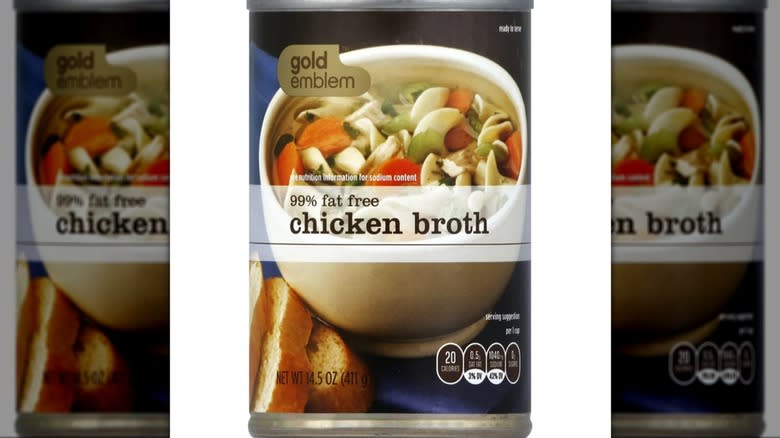
Most people may not think of CVS as a place to shop for groceries, but it does have an in-house food brand known as Gold Emblem, which has been around since 1995 and has quite a few foods you may wish to buy. Yet, its canned chicken broth states that it has 1,040 milligrams of sodium per 8-ounce serving. By contrast, most other brands have a more realistic serving size of one can or approximately 12 to 14 ounces.
Discrepancies between serving sizes of the same kind of food can sneak up on people, who may automatically assume that the serving size is the full can as it is with other brands. If you did have the entire 14.5-ounce can, you'd be consuming 2,080 milligrams of sodium. That's only about 200 milligrams less than the maximum daily recommended amount by the FDA.
With 16 items currently on the ingredients list, this broth also carries a fair number of extras that you may or may not want. This isn't necessarily a bad thing, as nutrition labels with long lists can be filled with healthy ingredients. Yet here, many of the ingredients are additives like MSG, caramel coloring, and thickening agents. These fillers may add to the taste, but that can also be done with herbs, spices, or vegetables that may be more obviously beneficial to your health.
Swanson Beef Broth
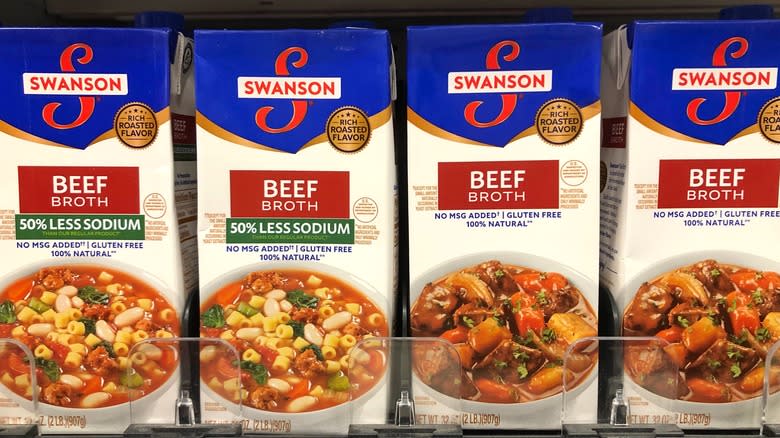
Swanson is a brand that is owned by the Campbell's company and which sells quite a lot of broth. Taste-wise, Swanson beef broth appears to be a fan favorite. As of this writing, over 770 reviews on Target's website give this product a 4.8 out of 5 stars, with many praising its taste.
Unfortunately, a good-tasting broth doesn't necessarily mean that it is good for your health. The sodium content for the Swanson beef broth is 1,141 milligrams for a 12-ounce serving. With nearly 50% of the daily recommended sodium intake, the level of taste may not be worth the added sodium that could affect your long-term health if you consume too much salt regularly.
This broth also has 1.5 grams of sugar in a 12-ounce serving. Most people wouldn't think that a salty item would have sugar in it -- but it does. Small amounts of added sugar in the foods we eat throughout the day can add up quickly, so it may pay to be aware of the added sugar here in relation to the rest of your diet.
Signature Select Chicken Broth
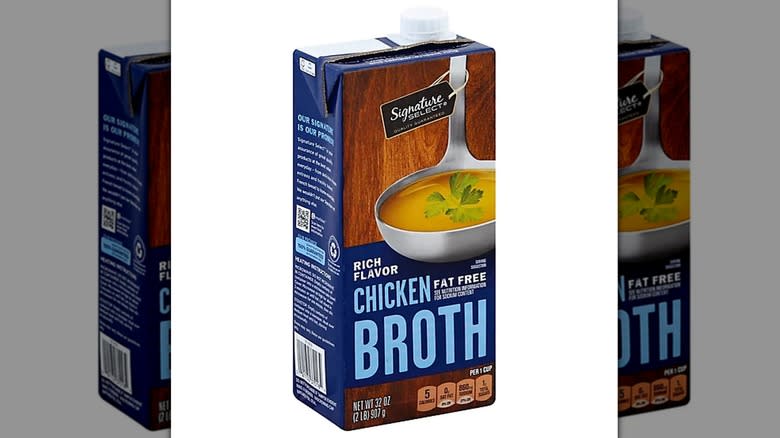
Signature Select is owned by Albertsons Company, which owns multiple food brands and sells all types of items, from ibuprofen to frozen meals. Its chicken broth has a fairly small list of ingredients, including onion powder and celery, which both have antioxidants that can help the body to decrease inflammation.
The chicken broth also contains 1,152 milligrams of sodium in a 12-ounce serving. This serving size is exactly 50% of the daily recommended amount, assuming you're going by the FDA-recommended amounts for an average adult. Besides excess sodium being bad for your overall health, it can also have more immediate effects. Most people who eat over 50% of the daily recommended amount of sodium in one sitting may experience bloating, excess thirst, headache, and increased blood pressure. It is better to spread out your salt intake throughout the day, anyway, a task this broth may complicate.
Good & Gather Vegetable Broth
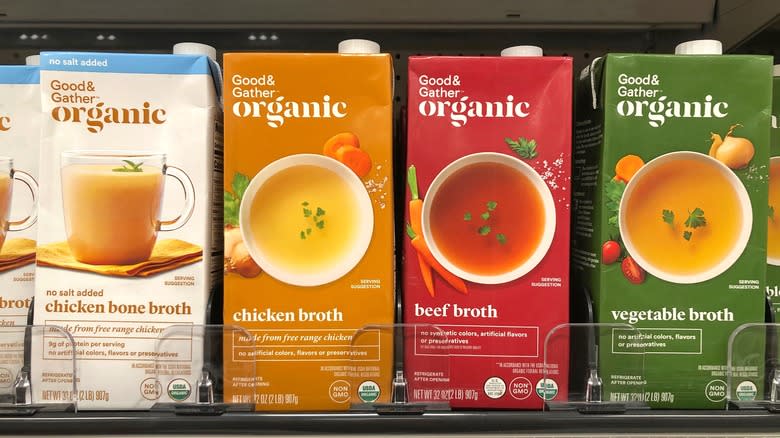
Target, a common fan-favorite amongst Americans, has its own brand called Good & Gather with some fairly impressive items in its lineup. Besides buying this brand at Target, you can also order Good & Gather items on Amazon and at Walmart.
Its vegetable broth has ingredients that, at first sight, are fairly healthy. There aren't many additives or known ingredients that would be considered unhealthy or unnecessary. The vegetable stock itself is made of water, carrot juice concentrate, onion juice concentrate, and celeriac juice concentrate. These items can hold great health benefits that are great for the immune system, like antioxidants, vitamins, and minerals.
Unfortunately, the positive ingredients list is overtaken by two things: sugar and sodium. This broth does contain 2 grams of added sugars in a 12-ounce serving, though you may argue that sugar is not necessary for broth -- after all, quite a few brands have zero grams of sugar. The American Heart Association recommends no more than 25 grams of added sugar per day for women and 36 grams for men. This can add up surprisingly quickly, too, as sugar is found in many common food items that Americans consume daily. As for sodium, there are 1,200 milligrams in a 12-ounce serving. This is 52% of the daily recommended value. There are other broths on the market that also have the nutrition benefits without the unnecessary sugar and high sodium.
Zoup! Good, Really Good Beef Bone Broth
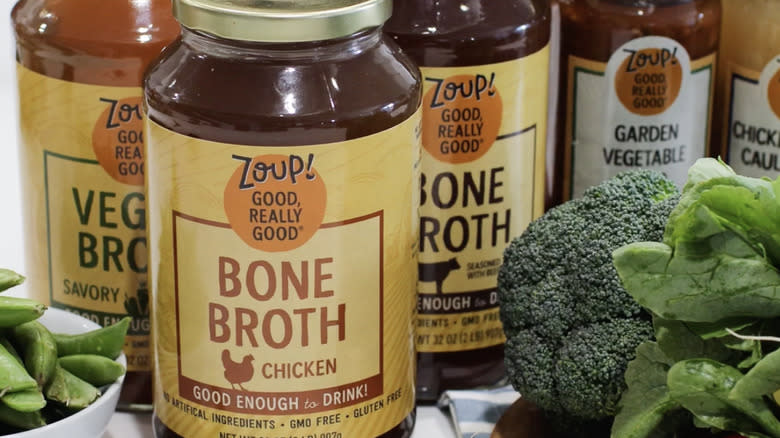
Bone broth is its own category of broth, and has risen in popularity in the past few years -- and there's a good reason for the interest from both bone broth-loving celebs and regular folks alike. Because it is cooked with the bones in the pot as long as possible, bone broth is reportedly more nutritious, leaving you with a broth chock full of protein, vitamins, minerals, and collagen.
Yet Zoup! Good, Really Good's beef bone broth didn't impress us. Jumping right into the sodium count, this product has 645 milligrams of sodium per 12-ounce serving -- quite high, especially in the world of bone broths. We found many other brands that sell similar bone broths with less than 450 milligrams of sodium.
This broth only contains six grams of protein in a 12-ounce serving, while other brands get the protein count above 10. And while this isn't strictly a health thing, it's also a bit boring flavor-wise. Most bone broth brands -- like the popular Kettle and Fire and Brodo, add herbs, spices, or vegetables for flavoring.
Campbell's Condensed Chicken Broth
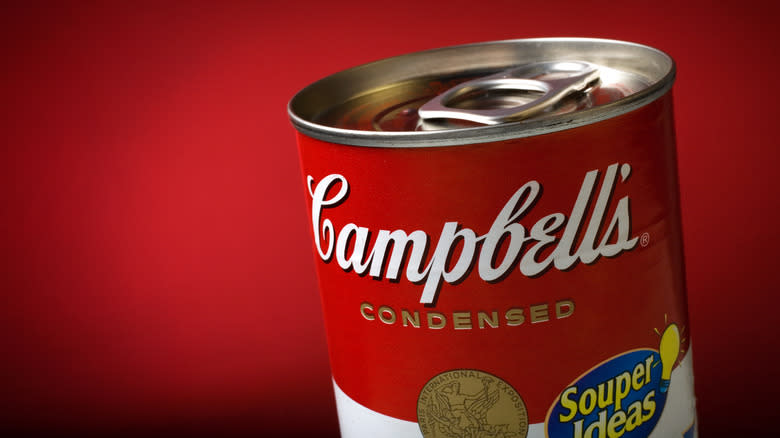
Oh, Campbell's. This brand is such an American classic, having been around since the 19th century. This is the brand for parents whipping up a batch of Campbell's chicken noodle soup to heal the ailments of their sick children. Unfortunately, we can't say that Campbell's broth is stocked with ingredients that will necessarily help banish your illness.
The Campbell's condensed chicken broth contains 750 milligrams of sodium per serving 1/2 cup serving. That is 33% of the daily recommended amount. The ingredient list isn't impressive, either, with celery broth as the sole vegetable ingredient.
The Campbell's chicken broth also contains chicken fat and corn oil, which contribute to the 3 grams of fat per serving. One gram of that is saturated fat, which is considered the "unhealthy" type of fat. Considering this item is available in virtually every grocery store in America, and made about $2.4 billion in revenue for the third quarter of 2024 alone, we were hoping this can would be packed with a more substantial nutritional content.
Great Value Chicken Broth
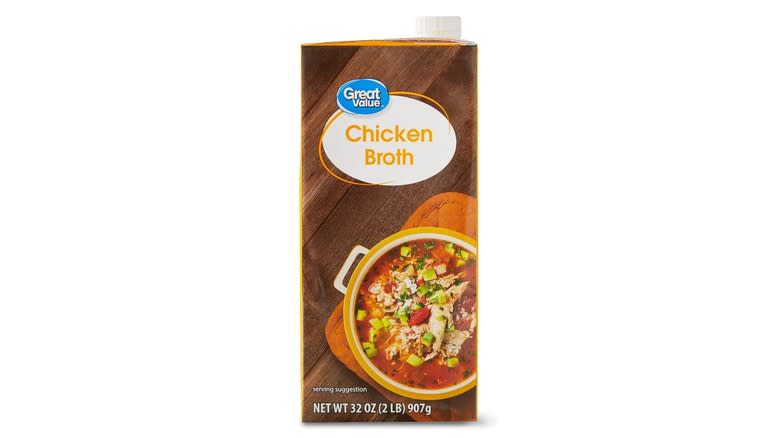
Great Value is Walmart's private label grocery brand and is known to be a very affordable option that carries all manner of kitchen and pantry staples, from some unhealthy Great Value items to surprisingly good ones. What's more, the ingredients list for its chicken broth is fairly impressive. It's a small list, too, which eschews many of the additives that you may wish to avoid. It has onion, carrot, and celery juice concentrate which do provide some vitamins and minerals other brands don't have.
Yet those positives are overshadowed by the sodium content, however. Great Value's chicken broth actually tops out at one of the highest sodium contents we've seen in a 12-ounce serving. This one has 1,245 milligrams of sodium, well over half of the daily recommended amount. Instead, be on the lookout for the reduced sodium versions, especially the reduced sodium organic variety, which has a somewhat more reasonable 630 milligrams in an equivalent serving.
Savory Choice Chicken Broth Concentrate
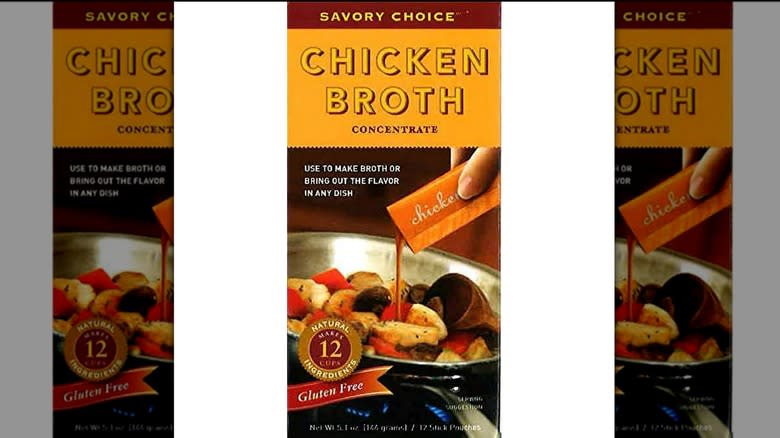
Savory Choice is a brand under the Kettle Cuisine umbrella. Kettle Cuisine specializes in soup, originally selling its products to restaurants themselves. Its chicken broth concentrate conveniently comes in small packets that hold a concentrated amount of broth. It can be used to season dishes like stir fry or risotto, or used to make a broth by mixing with hot water.
The Savory Choice chicken broth packet contains 20 calories total, but 10 of those calories come from fat. From the one gram of fat in a serving, half of that is saturated fat and half unsaturated. Saturated fat can raise cholesterol and while unsaturated fat is less potentially harmful, the FDA recommends you consume no more than 78 grams of total fat per day. When that's coming from a seasoning like this broth, the gram count can sneak up on you.
There is also 770 milligrams of sodium in each packet, coming out to about 33% of the daily recommended value. Considering the fact that this broth is suggested to be used as a seasoning to a dish, the excess sodium and fat could be avoided by choosing a different brand.
Progresso Classic Chicken Broth
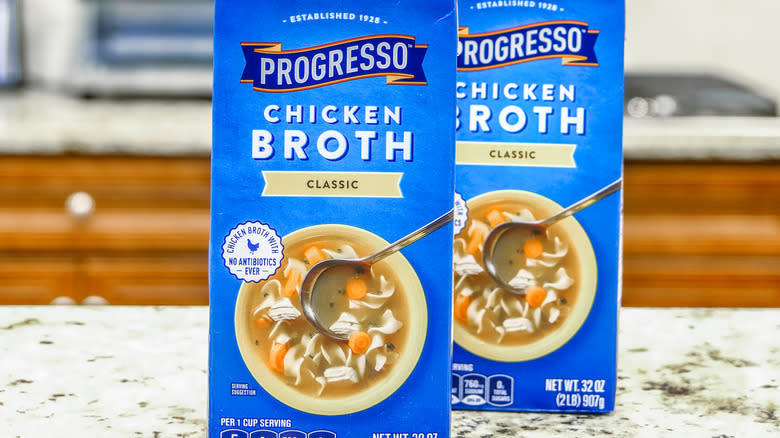
Progresso is a brand that many people know and love for its soups. Progresso states that it believes in quality ingredients with zero grams of trans fat, high fructose corn syrup, and no added MSG. It also makes sure that none of its soups contain artificial flavors.
When looking at its classic chicken broth, the ingredient list is quite simple, with just four items: chicken broth, salt, carrot puree, and natural flavor. Natural flavors is quite ambiguous, though it general means that a product can contain naturally-derived flavors that may still be processed somewhere. The actual sourcing of the flavor doesn't need to be listed on the nutrition panel, so it's difficult to tell if the natural flavors are heavily processed. They also have no official FDA-approved definition, further muddying the waters (via Healthline).
While puzzling over the ingredients, you may still deem the sodium content to be a big red flag, with 1,185 milligrams of sodium in one 12-ounce serving of the broth, or about 51% of the daily recommended dose. The FDA states that 20% or more of sodium in one meal is considered high. Instead, we recommend getting the reduced sodium version of this broth.
College Inn Beef Broth
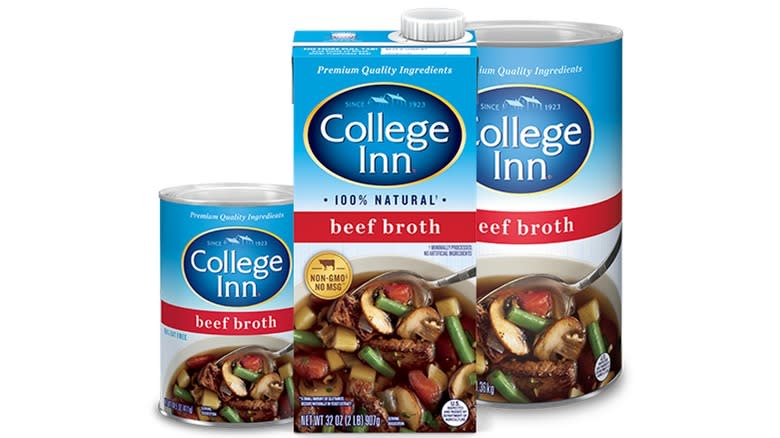
College Inn is a brand that is relatively affordable and which many Americans use as a staple in their pantry. As one reviewer on the College Inn website said, "If you want your pastas and vegetables to be full of flavor then pick up a carton of College Inn Brand Beef Stock instead of water the next time you cook." Others likewise praised the taste of this broth. But how does it really stack up, nutritionally speaking?
As suspected, College Inn's beef broth contains a large amount of sodium. In a 12-ounce serving, it has 1,140 milligrams of the stuff, or nearly half of the daily recommended amount. However, there are only 15 calories in 12 ounces of this broth, with zero fat.
College Inn does have a less sodium version which has 600 milligrams of sodium per 12-ounce serving. However, other brands offer similar ingredients with even lower sodium.
Methodology

While searching for the unhealthiest broths that are currently on the market, we took care to comb through each brand's nutrition labels. We looked at each brand's sodium content, which we've compared to the Food and Drug Administration's recommended daily intake. We also kept an eye out for saturated and trans fats, sugar, flavorings, and other additives, as these products typically contain low nutritional value and may have adverse health effects (especially if consumed regularly and in large quantities). Finally, we calculated out similar serving sizes for each broth to make these comparisons fairly equivalent across brands.
Read the original article on Mashed.

